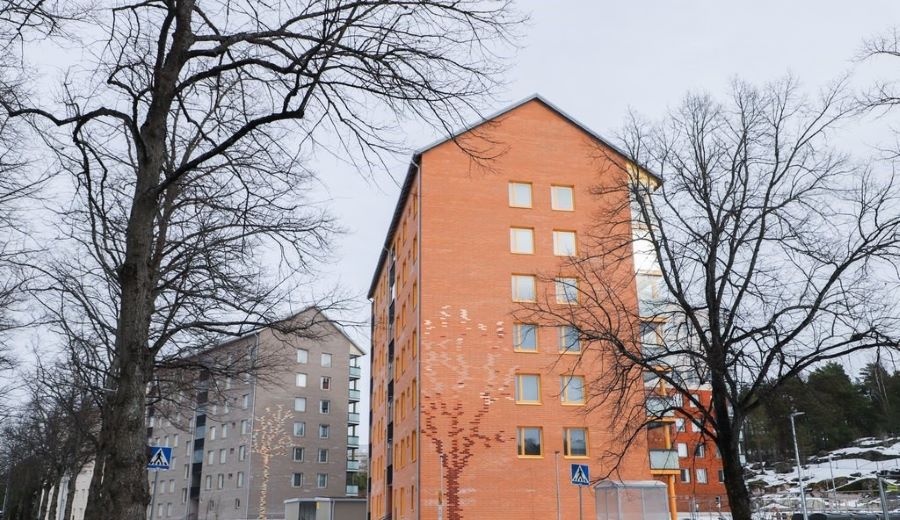More and more housing in Finland is being built and financed considering social and environmental aspects, in which our customers, the affordable social housing organisations and municipal rental housing company projects, play a significant role. Last year the share of green and social finance of our housing loans was a record high 63 percent.
“An increasing number of our customers have made it their mission to carry out their projects more sustainably , taking into account environmental, climate or social benefits. Affordable social housing production is at the absolute forefront of sustainable construction in Finland”, says Päivi Petäjäniemi, Customer Relations Manager at MuniFin.
MuniFin was the first in Finland to start offering green finance for climate and environmentally friendly projects in 2016. In 2020, we also became the first to launch social finance, which emphasizes the social benefits of the projects: equality, communality, safety, welfare, or regional vitality.
“Our customers were among the first to learn about green and social finance, and we have persistently kept the topic on the agenda ever since. Nowadays, they have comprehensive knowledge of their alternatives, and they proactively seek green and social finance to give visibility to their projects. All their projects are significant for the Finnish welfare society, but the ones that fall under the green and social finance framework, are truly best in class”, Petäjäniemi explains.
Buildings and construction account for about a third of Finland’s greenhouse gas emissions*. The figures show that Finnish municipalities and non-profit housing operators are strongly involved in climate efforts.
The energy efficiency of affordable social housing buildings is generally higher than buildings in the private sector*. One factor is the forthcoming Corporate Sustainability Reporting Directive (CSDR), which is already directing the larger operators towards more sustainable choices. Also, the residents of newly constructed homes are increasingly demanding more energy-efficient housing solutions.
“More and more buildings are built in energy class A, which is the minimum demand in our green finance framework. Our customers are bold and want to try new things, so I expect to see a rising number of projects that also consider the impacts of the entire life cycle and construction chain. The challenge for now is that the costs may seem higher in the construction phase. Saved energy costs for example, show in the long run, and our customers have strict demands for affordability from The Housing Finance and Development Centre of Finland (Ara) that oversees the projects.”
The prerequisites for the approval of social finance projects consider the social benefits of the projects.
“Our customers are increasingly planning housing as a whole, and this is clearly visible in projects for special groups. For example, they want to provide every student with their own apartment, but there is increasing investment in shared spaces, which promotes community and prevents loneliness. Residents are also offered various services, such as car-sharing or resident counselling”, Petäjäniemi says.
Finnish affordable social housing supports social mixing and brings down homelessness
In Finland, affordable social housing is mainly provided by municipality-owned companies and nationwide non-profit organisations. The production is financed through interest subsidy loans. The loans are guaranteed by the Finnish state through The Housing Finance and Development Centre of Finland (Ara), which is administered by the Ministry of the Environment. Alternatively, housing projects can also be loans to municipality owned companies. These loans do not have a state interest subsidy, but they come with a 100% municipal guarantee.
MuniFin is the main financier of affordable social housing production in Finland. The loan periods are long, up to 41 years.
The Finnish government updated its housing policy development programme in 2021. Some of the main objectives of this programme include increasing housing construction in growing urban areas and eradicating homelessness within two government terms. Affordable social housing has played a remarkable role in tackling homelessness in Finland, especially family homelessness. Affordable social housing is also instrumental in preventing segregation and facilitating labour mobility.
Read more:
Finnish system for affordable social housing supports social mixing and brings down homelessness
Our sustainability agenda sets the direction until 2035
As outlined in our strategy, key aspects of sustainability at MuniFin include acting as our customers’ partner in building a sustainable society while efficiently managing climate-related and environmental risks.
Our long-term impact stems from the products and services we offer our customers. In our sustainability agenda published in 2023, we set the direction and goals for our sustainability efforts until 2035.
In this agenda, we commit to increasing the proportion of sustainable finance in our lending portfolio into one third by 2030. In 2023, the share was 21,3 percent. We also set emission reduction targets for financed buildings. Our target level is 8 kgCO₂/m² by 2035, representing reduction compared to the 2022 level.
*The Confederation of Finnish Construction Industries RT (CFCI): https://rt.fi/tietoa-alasta/ymparisto-ja-ilmasto/vahahiilinen-rakentaminen/
*Finnish Affordable Housing Companies’ Federation: https://www.kovary.fi/kohtuuhintaisilla-asuntotoimijoilla-energiatehokkaita-kiinteistoja/
More information
Karoliina Kajova
Senior Manager, Funding
+358 50 5767 707




